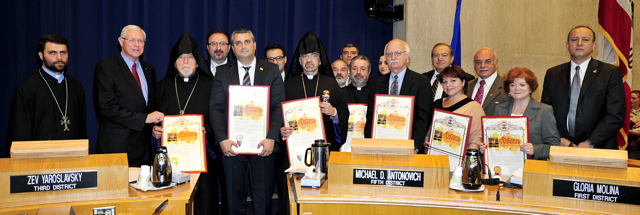
It is often called the “forgotten holocaust,” overshadowed by the well-known and -documented Jewish holocaust of World War II, whose remembrance holiday was discussed today on the Post. This systematic murder of some 1.5 million Armenians by the Ottoman Turks in between 1915 and 1917 during the Great War (WWI) is often referred to by historians as the sad inspiration behind Hitler’s own holocaust when on August 22 of 1939, he chillingly proclaimed, “Who, after all, speaks today of the annihilation of the Armenians?”
That quote is eerily truthful in many respects, as this particular holocaust remains — at least until the past few years or so — relatively unknown amongst many people. The reason was rather simple: the war itself overshadowed its execution and documentation, somewhat shrouding the event in abstruseness. To add further to the mystery of the event, Turkey itself largely chose to ignore it, outraging the Armenian community as time passed. That changed in 2007, when the German Deutsche Bank unearthed photos taken by its employees who were working on a railway in the region during the time.
Beyond public knowledge of the event, there is a deeper rift between what to designate the event as: was it or was it not a genocide? The implications of this are massive, having driven academics and the international community into a divisive group polarized by one side proclaiming historical revisionism and another side saying the Republic of Turkey cannot be held responsible for the event, for the term “genocide” itself carries criminal weight with it, possibly against the Republic of Turkey. Some Turkish intellectuals have even been arrested for terming the event a genocide; this is the weight of determining what this event was. To this day, there is no official recognition by Turkey that the event was a genocide; it is often referred to as a “deportation” or “relocation” since the Armenians posed a Russian-sympathizing threat.
Within the U.S., it was narrowly decided by a congressional panel to be termed a genocide on March 4 just two years ago. The Board of Supervisors, led by Supervisor Michael Antonvich, proclaimed April 24 as “Day of Remembrance for the Armenian Genocide of 1915-1923” throughout Los Angeles County.
“Due to this horrible tragedy, the Armenian community is committed to ensuring that those who have died, were tortured and tattooed during this are never forgotten,” said Antonovich. “By consistently remembering and openly condemning the atrocities committed against the Armenians, Los Angeles County demonstrates its sensitivity to the need for constant vigilance to prevent similar events in the future.”

